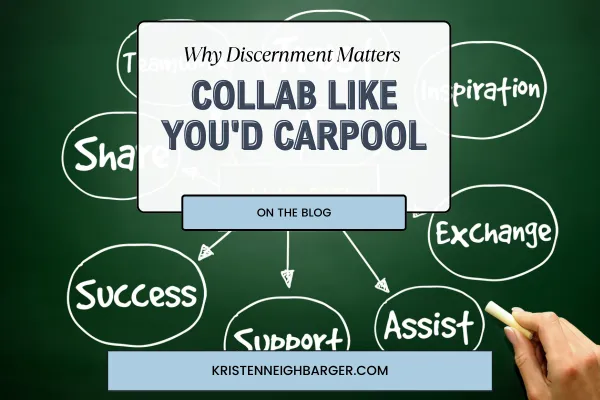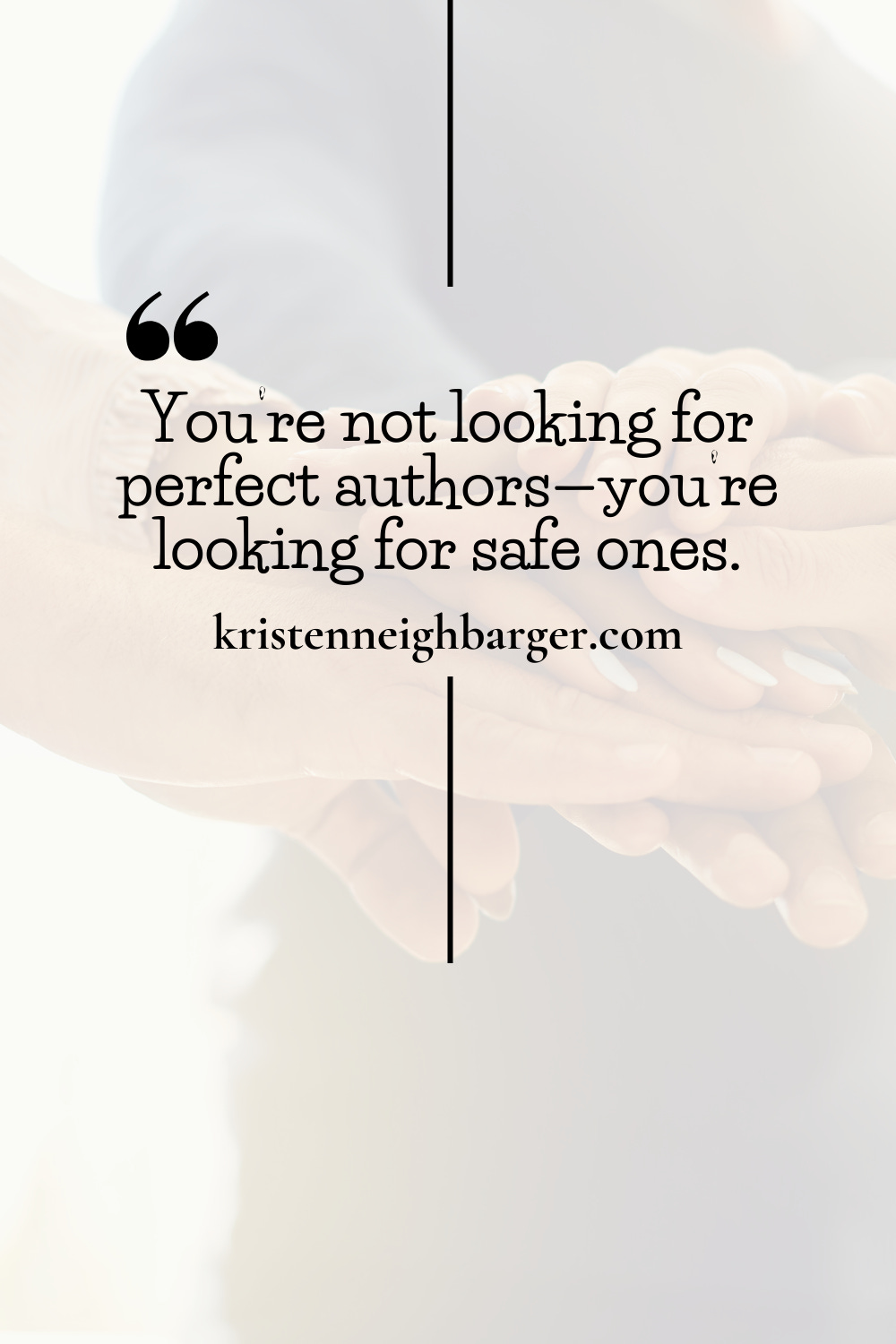
Collab Like You'd Carpool
As a recovering “good girl,” one of the things I’ve had to work really stinkin’ hard at healing and moving away from is my ingrained savior complex.
Cutting my teeth on the backs of those pews in the throes of legalism taught me it was my duty to save everyone I came in contact with.
Here me when I say…loudly…we aren’t talking about some solid discipleship here–we’re talking about seeing everyone I met as a prospect instead of a person.
Needless to say, this encouraged some exceptionally unhealthy mindsets and behaviors as well as developed some terrible habits in my life and personality.
I spent years as a people-pleasing, perfectionist, peacekeeper.
Obviously, I wasn’t going to be able to save everyone if I couldn’t keep them happy, do everything perfectly, and maintain smiles all around.
Thankfully, I spent years in therapy healing from this cocktail of awfulness. Still, though, I find myself reverting back to those same habits if I’m not diligent.
Being an author, developing authorly relationships, participating in groups, showing up on Zoom coaching calls, and working primarily online doesn’t always create a culture where I feel comfortable advocating for myself, standing up for what’s right, and setting boundaries.
If you’re anything like me, then maybe it’s a struggle for you as well.
We work in an industry that thrives on collaboration, networking, and relationships (even if most of them are online). Consequently, we interact daily with folks we likely have never even met in real life. Our communication with them, then, tends to take place in Facebook Groups, on posts, in DMs, and maybe, if we’re lucky, on Zoom calls.
Here’s what I’m learning: these relationships are challenging to manage.
In the real world, it doesn’t take us long to see red flags in people. It doesn’t take us long to figure out who those people are in the office we don’t want to be associated with. And, it definitely hits us early who is toxic and we should avoid.
Online, though, that isn’t always the case.
It’s easy to fake it on social media, in posts, and even in interactions in groups.
It’s a little more difficult to hide who you really are on multiple Zoom calls, but, hey, some people have that skill.
So, today, I want to talk to you about the importance of honing your discerning spirit as an author, so I can hopefully save you some of the heartache and struggles I’ve had over the last few years as an author.
Think about it like this–you wouldn’t choose to carpool with just any old driver, so why choose to collaborate with just any old author.

5 Tips for Choosing the Right Authors to Collaborate With
(Collab Like You'd Carpool!)
1. Look Beyond the Feed.
A polished Instagram grid or fancy bio doesn't tell the whole story. Pay attention to character — not just content. Choose people you’d trust behind the scenes, not just admire from a distance.
2. Watch How They Drive in Traffic.
Translation: See how they treat everyone, not just potential "big names." Are they patient, respectful, and kind even when things get messy (or slow)? Character shows up most clearly in crowded, unglamorous moments.
3. Choose People Going the Same Direction.
Shared niche is good; shared values are better. Make sure you’re aiming for the same destination — not just hitching a ride because it looks convenient right now.
4. Test Drive Before You Road Trip.
Start small: share each other's posts, co-host a giveaway, hop on a casual Zoom call. Collaboration is a relationship — don’t commit to a major project before you know how they handle curves and bumps.
5. Pay attention to the Warning Lights.
If you feel uneasy, don't ignore it.
You don't need someone else to validate what you already sense.
Watch for warning signs like these:
They gossip about other authors or tear people down behind their backs.
They’re quick to criticize but slow to celebrate others' wins.
Their public persona doesn’t match how they behave in private conversations.
They only network "up" and ignore people they see as less beneficial.
They push for rushed collaborations without taking time to build trust.
They hint at entitlement ("You owe me this," "I deserve that") early on.
They react defensively, manipulatively, or disrespectfully when you set boundaries.
One or two off moments don’t necessarily mean danger—everyone has a bad day.
But consistent patterns of disrespect, manipulation, or self-centeredness?
That’s your sign to take the next exit.
Trust your discernment.
It’s a lot easier to slow down at the first warning light than to rebuild after a wreck.
Remember: you're not looking for perfect drivers—you’re looking for safe ones.

When You're Stuck in the Carpool Lane Without an Exit:
(What to Do When a Collaboration Isn't Working)
1. Stay Calm and Keep Your Hands on the Wheel.
Panic never makes for good driving — or good decisions. Take a deep breath. You don't have to swerve into oncoming traffic just because you’re uncomfortable.
2. Check Your Mirrors Before You Merge.
Before making a move, assess the situation carefully. Is this a temporary bump (like a busy season) or a pattern of misalignment? Gather your thoughts and, if needed, document anything important.
3. Signal Clearly and Early.
If you need to change course, communicate honestly and respectfully. You don't have to over-explain, but a simple, clear message ("I’m realizing this project isn’t the best fit for me right now") honors both you and them.
4. Exit Safely — Even if It's Not Where You Planned.
Sometimes you have to get off at the next safe exit, even if it’s not the perfect one you imagined. It’s okay to step away from a collaboration mid-project if it’s affecting your well-being or values.
5. Reflect, Recalibrate, and Keep Driving.
After you exit, don’t just hit the gas and speed away. Take time to reflect: What red flags did you miss? What would you do differently next time? Growth is the best souvenir from a wrong turn.

Final Thought:
No Response Is Still a Response.
When someone shows you who they are, believe them.
You don't owe a rebuttal. You don't owe closure. You don’t even owe a goodbye.
Silence is a response.
Walking away is a response.
Protecting your peace is a response.
You can't out-argue insecurity. You can't out-reason pride. And you can't fix someone else's character by setting yourself on fire.
The people meant to walk with you won't need convincing.
Everyone else? Let them pass by. You're still moving forward.
🌿 Looking for fresh inspiration and real connection with fellow writers?
The Hope Story Conference is happening January 29–31, 2026 in Charlotte, North Carolina, and it’s one of my favorite spaces for writers who want to grow in both craft and calling. With keynote speakers like Ruth Chou Simons and Ann Voskamp, you’ll leave refreshed, equipped, and reminded that your story truly matters.
It’s a weekend filled with practical workshops, meaningful community, and encouragement for every stage of the writing journey.
👉 Grab your ticket here:Hope Story Conference
(That’s my affiliate link—thank you for using it to support my work!)
